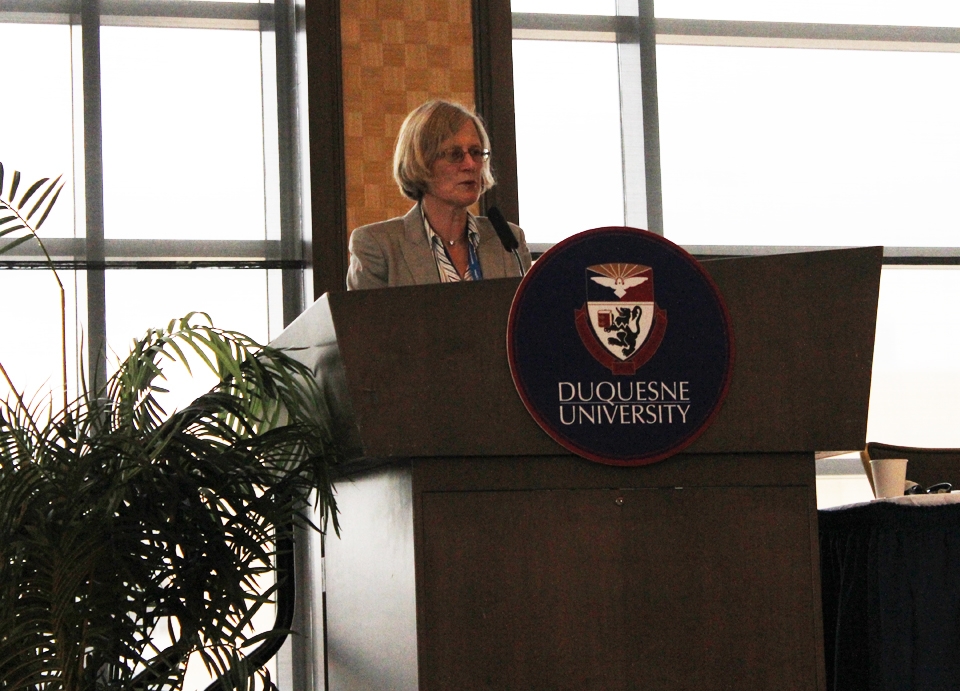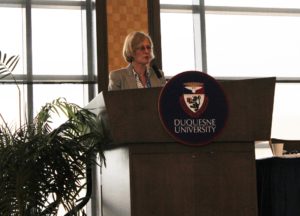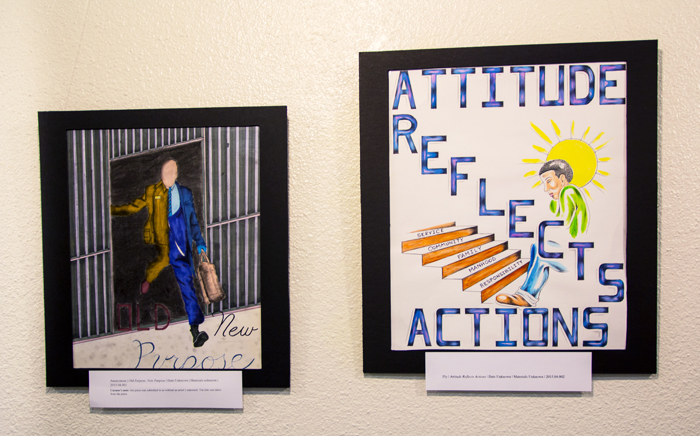

Notre Dame theology professor Celia Deane-Drummond speaks at the Sept. 28 event.
Kailey Love | Photo Editor
In 2015, the pope called upon Catholics around the globe to look at the world around them and take steps to protect the environment. A year later, Duquesne contributed toward this goal over the course of two days with its annual Integrity of Creation conference.
Inspired by Pope Francis’ encyclical entitled “On Care for Our Common Home: Laudato Si,” Duquesne’s second Integrity of Creation Conference took a deeper look into the importance of preserving the environment through scientific, religious and social lenses. The event featured nine speakers from multiple disciplines.
Jordan Potter, a research assistant and healthcare ethics graduate student who worked as one of the lead coordinators on the conference staff, stressed the importance of an interdisciplinary approach to protecting the environment.
“Protecting our common home is, by nature, an interdisciplinary task. It requires contributions from various different disciplines and area of study to fully address,” Potter said. “This includes contributions from the environmental sciences, the life sciences, theology, philosophy, law and business, along with many other approaches.”
The conference included an introductory welcome speech by the newly inaugurated President Ken Gormley.
Presentations began Wednesday, Sept. 28 at 7 p.m. and continued the next day from 7:30 a.m. until 4:00 p.m. The conference was open to all students and faculty, and a live stream broadcasted the presentations worldwide.
“This also allowed Spiritan members from around the world to watch the conference live, and many Americans from across the country also took advantage of this opportunity, from the West Coast in San Diego, California to the East Coast in Boston, Massachusetts,” Potter said.
Potter was happy with the viewership the livestream attracted.
“We had 91 views from across the country and world on Wednesday night alone during our first plenary presentation by Dr. Goodenough,” he said.
Ursula Goodenough, a biology professor at Washington University, kicked off the conference with her speech entitled “The Evolutionary Dimensions of Laudato Si,” which focused on the scientific side of the encyclical.
Another presenter, Notre Dame theology professor Celia Deane-Drummond, highlighted the theological implications of the environmental issue in her presentation, “Theological Anthropology of Laudato Si,” on the second day of the conference.
Her speech revolved around the ideals of Pope Francis as a theologian as well as a trained chemist, and the connection he made between environmental issues and the problem of global poverty.
She also claimed that people today are too concerned with material things, rather than the world around them.
“We’ve attached ourselves to the wrong kinds of things,” Deane-Drummond said in her speech.
Deane-Drummond argued that one of the largest obstacles humans have in trying to solve environmental issues is “over attachment to technology and social media, and lack of sensitivity to other’s pain.”
Aside from creating an interdisciplinary discussion of the pope’s plea for the protection of the common good, the conference also aimed to educate students and highlight the need for change that ultimately will fall on the shoulders of the younger generation.
“I think academic events like this can really highlight the practical nature of this issue, because protecting our common home is a cause that younger college students have a vested interest in,” Potter said.
Potter thinks that college students can be crucial participants in the pope’s vision.
“By educating them and showing them how to get involved, college students represent an abundant source of energy and potential that can be immediately dedicated to promoting the cause of protecting our common home,” he said.




